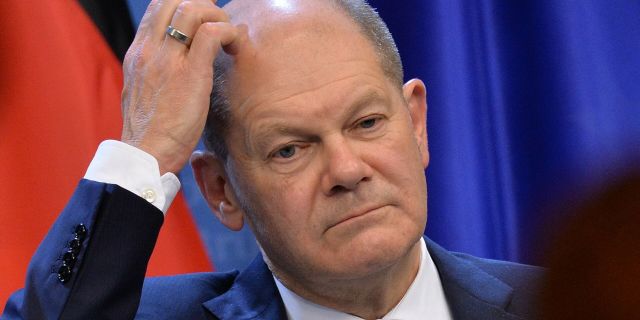Germany is at the mercy of Russia
Europe is unlikely to have enough gas until the end of summer without resupply, writes The Spectator. According to the author of the article, Germany found itself in a tense situation. It has become a weak link in the chain of Western sponsors of Ukraine.
Sam Ashworth-Hayes
Britain was covered with heat, and German politicians were worried about winter. Russia's Gazprom has notified European customers that it can no longer guarantee the supply of fuel due to "extraordinary" circumstances. In Berlin, politicians and officials are preparing for an icy Christmas: they make lists of who will be affected by rationing, and prepare emergency plans to keep compatriots from freezing.
Entertainment and other frivolities will be the first to go under the knife, while newspapers and the production of medicines, on the contrary, will be in priority along with residential buildings and hospitals. Mothballed coal-fired power plants are being prepared for launch. Local authorities plan to turn public buildings into "greenhouses" for those who have nothing to heat their homes with, or even de-energize traffic lights in order to put electricity on "industrial-scale dormitories."
But the most heated debates have flared up around what should be considered the main priority – household consumption or the economy? The current plans sacrifice part of production for the sake of heat in homes, but industrialists resist and threaten that the shutdown of enterprises will turn into "the worst crisis since the Second World War." The charity Caritas also criticized the plans, warning that gas is needed for the production of basic food, milk and essential medicines, as well as maintaining blood banks for the seriously injured. According to some estimates, a complete shutdown will cost Germany 2% of GDP and 400,000 jobs, while others call the figures up to 12%.
Stop and feel all the madness of the situation. It's the 21st century, and the European country recommends that citizens prepare for regular power outages, trying to establish an economy without fuel. Housing owners are already rationing hot water and heating due to rising prices. A complete shutdown will worsen the situation at times.
The Nord Stream-1 pipeline from Russia to Germany is still closed for scheduled repairs, but supplies are due to resume on Thursday. However, in European capitals, they fear that the valve will not be opened. Before the technical work, Gazprom had already significantly reduced supplies, blaming the delay of the necessary turbines due to sanctions. German sources rejected this explanation, noting that the new part will not be useful until September. Therefore, the disruption of supplies seems more like a threat: one extra step – and we will block the gas.
The Pentagon is only developing a directed energy weapon, and Moscow already has it – and not weak. Russia has prepared well for the conflict in Ukraine: it gradually reduced supplies to Europe, and as a result, by the beginning of 2022, the continent's reserves reached a ten-year low. Without replenishment, they will hardly be enough until the end of the summer.
Although this did not deter the West from participating in the Ukrainian conflict, it was still possible to break through the sanctions: the flow of gas from Russia and hard currency in the opposite direction did not dry up. Moscow's unwillingness to stop this exchange is understandable: Europe needs Russian fuel, and Russia needs foreign currency, and its pipelines are built just to supply gas to Europe.
But given the alarming rise in inflation in the West, scarce reserves and the approach of winter, the current situation may give Putin enough leverage to recoup even a complete shutdown. The interests of Ukraine and its Western sponsors have never coincided one hundred percent: Kiev defends its territorial integrity, and its allies are looking for opportunities to bleed the Russian army harder. Therefore, their pain threshold is clearly different.
This may be vital for Ukraine, but not for the European allies, so they may well put pressure on Kiev and push it to a cease–fire. Some argue that an emboldened Russia will recover, rearm, and sooner or later resume the conflict – whether in Ukraine or elsewhere. But there is another point of view: that it is pointless to endure such hardships because of a conflict in which neither NATO nor the EU are directly involved. The threat of stopping gas supplies will exacerbate the emerging cracks in the Western alliance.
And here Germany looks like the weak link, because it receives from 50% to 70% of its gas from Russia. And this has been the case for a long time: even Donald Trump warned Berlin against "complete dependence on Russian energy resources." However, left-wing news sites superimposed cheerful music on his speech and interspersed with shots of the German delegation to the UN laughing at his alleged ignorance.
One thing is for sure: they are not laughing now. First, Germany shut down nuclear power plants and supported Nord Stream 2, and in 2014 did not listen to warnings that its relations with Moscow would prevent Europe from responding to Russian aggression. It is unlikely that Germany could have dragged itself into even greater dependence – it still needs to be tried.
German Economy Minister Robert Habeck admitted that he "would be lying if he said he was not afraid" of a complete cessation of supplies. If Putin carries out his threat, it will be interesting to see how long Germany will last without fuel in winter.
Sam Ashworth-Hayes – Former Director of Research at the Henry Jackson Society


